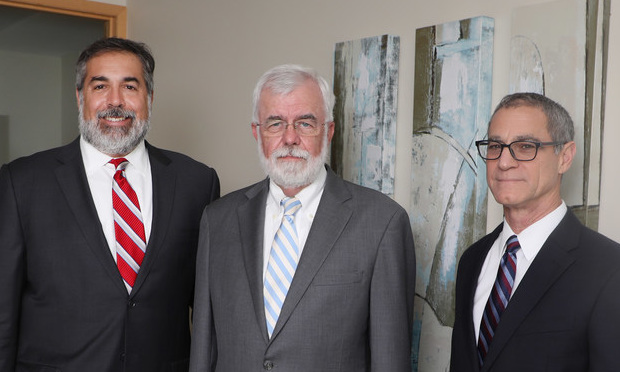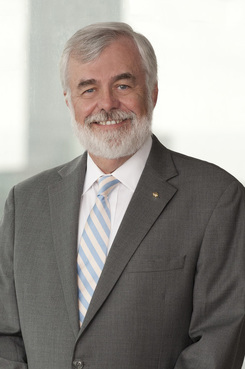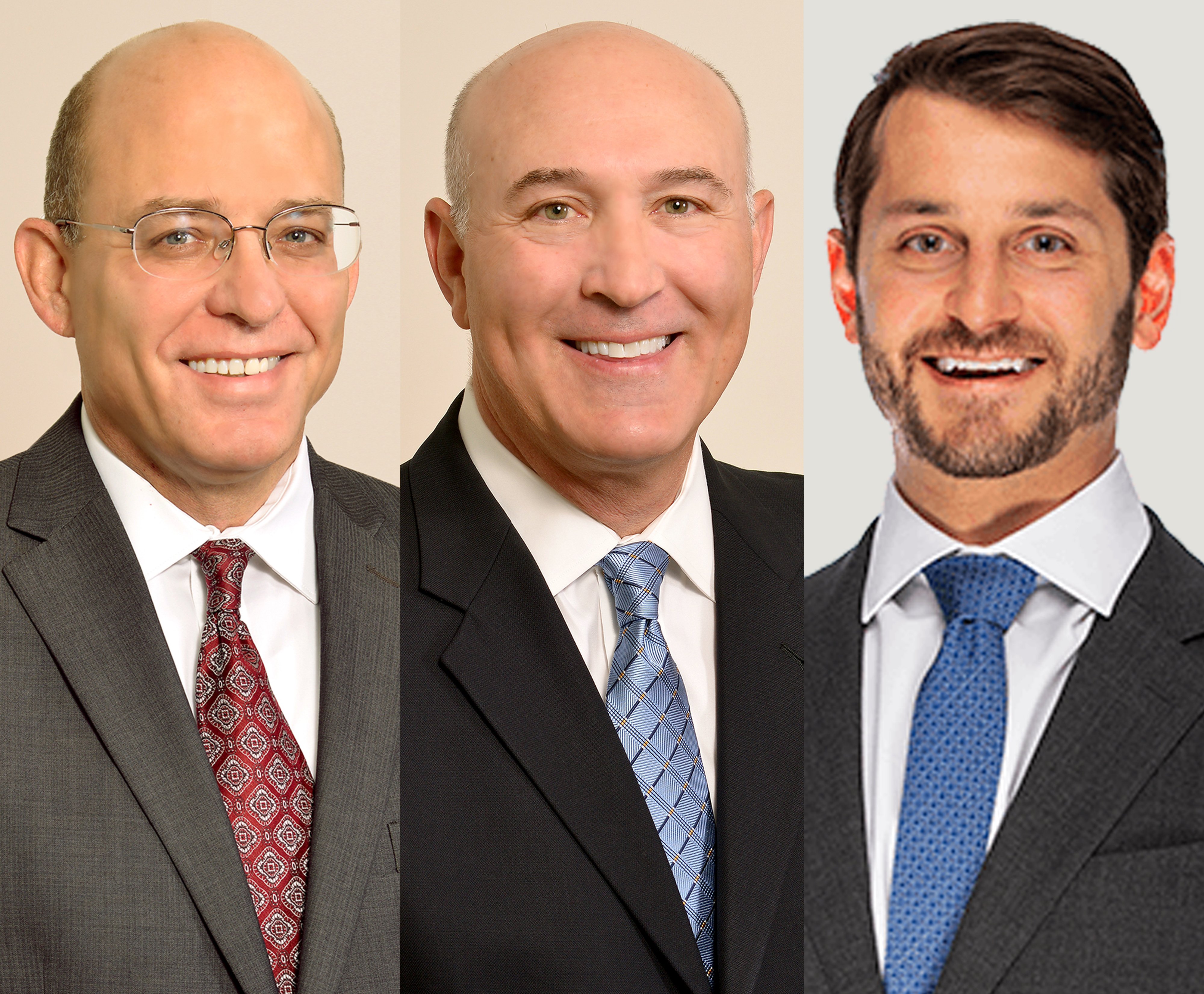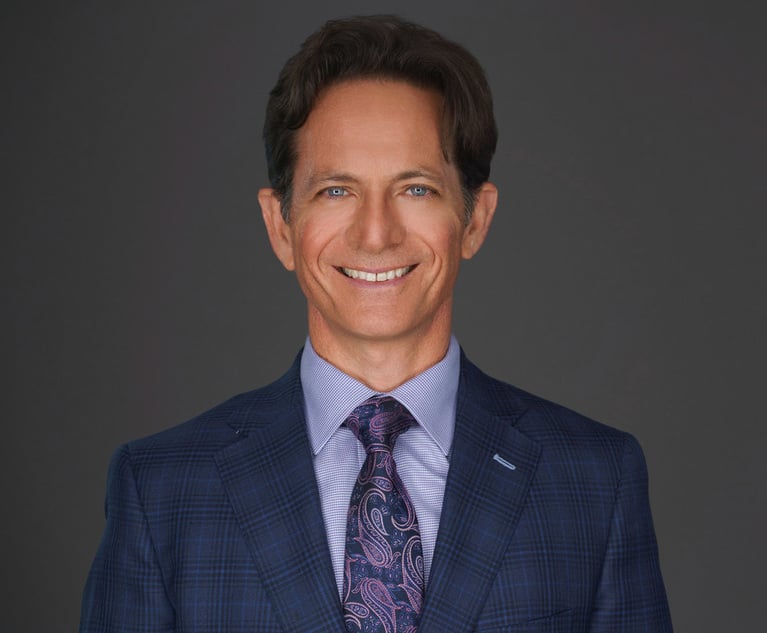Miami Lawyers Shield Helmet Maker From Brain-Damaged Cyclist's $17M Claim
A team of Carlton Fields lawyers in Miami argued that cyclist Kirsten Walker wouldn't have suffered brain damage if she'd worn their client's helmet as instructed.
October 15, 2018 at 03:30 PM
6 minute read
 Jeffrey A. Cohen, Benjamine Reid and Gary M. Pappas with Carlton Fields in Miami. Photo: J. Albert Diaz/ALM.
Jeffrey A. Cohen, Benjamine Reid and Gary M. Pappas with Carlton Fields in Miami. Photo: J. Albert Diaz/ALM.
Miami lawyers Benjamine Reid, Gary M. Pappas, Jeffrey A. Cohen and Justan Bounds of Carlton Fields quashed a $17.5 million claim against their client, bicycle helmet manufacturer Bell Sports, after a triathlete fell and suffered brain damage while wearing one of the company's “Giro Skyla” helmets.
On May 20, 2012, Kirsten Walker “suddenly lost control” of her bike” at the “Iron Girl Triathlon” in Buford, Georgia, according to the lawsuit, in which $17.5 million was at stake.
When Walker hit the pavement, she “severely” injured the left side of her body and the back of her head, which she claimed ”was covered and supposed to be protected by the subject helmet.”
The accident triggered a string of costly medical procedures, which, according to pretrial filings amounted to $816,460 in bills. Walker also claimed between $1.9 million and $2.6 million in lost wages.
According to Walker's complaint, the helmet ”failed to provide adequate and reasonable protection” to her head and didn't come with “adequate warnings regarding the limitation and hazards associated with the helmet.”
But the jury ultimately sided with Reid and his team, who argued that the helmet would have fully protected her if she'd worn it correctly.
 Cyclist. Courtesy photo
Cyclist. Courtesy photoClick here to read the full complaint against Bell Sport
Plaintiffs attorney Ranse Partin of Conley, Griggs & Partin in Atlanta told Daily Business Review affiliate the Daily Report that he was “very disappointed” with the verdict and plans to appeal.
Arguing that Walker had worn the helmet incorrectly, it was up to Reid and team at trial to prove that that wasn't Bell Sports' fault. Doing that required a deep dive into Bell Sports' instructions manual and its specific wording.
“You can always say something a different way,” Reid said. ”And sometimes juries believe that you should have said it the other way instead of the way you chose. Why didn't you say one more word, or why didn't you put one more symbol? Things like that.”
The key in this case, according to Reid, was to prove Walker had “independent knowledge” of the risks associated with the product, and was aware of “the importance of the helmet fitting properly.”
 Benjamine Reid, with Carlton Fields in Miami. Photo: J. Albert Diaz/ALM.
Benjamine Reid, with Carlton Fields in Miami. Photo: J. Albert Diaz/ALM.“And in fact she did,” Reid said. “The plaintiff testified that she was aware of the risk associated with the helmets and she was aware that the helmet was designed to protect the part of the head that it covered, and that if it didn't cover part of the head it wouldn't protect it.”
The jury also heard evidence from Walker's husband, who said he saw her putting the helmet on immediately after she'd bought it, and remembered seeing her looking in the mirror with the manual open.
“Presumably, she was trying to get it the way it looked in our photograph,” Reid said.
The manual, according to Reid, came in three forms — written instructions on the box, graphic labels inside the helmet and the instructions manual itself, where the final instructions and warnings are.
“In the helmet itself, we have a drawing that shows right way and wrong way,” Reid said.
As with most bike helmets, Walker's had two angled straps which join below the ears to become one strap under the chin.
“That's called a tri-glide,” Reid said. “We instruct and show pictures of where the tri-glide should be, and it's just below the ears. In this particular case, when the helmet was examined after the accident, those tri-glides were found moved all the way down to the bottom, below the chin.”
This was inconsistent with Bell Sports' written and graphic descriptions, Reid and his team argued.
Sympathetic Plaintiff
Each side brought in warnings experts, who analyzed the psychology behind people's reactions to warnings. Bell Sports also called helmet expert David Thom to examine the helmet and give evidence.
“He's the one that figured out where the tri-glides were at the time of the accident,” Reid said.
Cases involving severely injured plaintiffs can often present a common obstacle for defense attorneys like Reid.
“Anytime you have a very nice lady who's seriously injured, jurors have to be able to put sympathy aside and decide the case on the merit,” Reid said. “Sometimes, it appears the sympathy became more of a factor, but off course the judge instructs them not to do that.”
Avoiding that means conceding to a jury that a tragedy occurred.
“We give them, if you will, permission to be sympathetic because we're all sympathetic,” Reid said.
Bell Sports hasn't had a lot of litigation, so finding out what happened to Walker, according to Reid, was “considered very important” to the company.
“Bell has always been vitally interested in safety,” Reid said. ”It's a real concern to Bell when somebody gets hurt using one of our helmets, and it just happened to be the first time anybody had brought an action or made a claim that there was anything wrong with the instructions for this helmet.”
Reid said that Bell Sports “aren't celebrating” but “feel gratified that the jury believed that what they had done made sense and that they did the right thing.”
Read the jury verdict:
Case: Kirsten Walker v. Bell Sports Inc.
Case no.: 1:17-CV-1483-RWS
Description: Products liability
Filing date: May 5, 2014
Verdict date: Sept. 28, 2018
Judge: U.S. District Judge Robert W. Story, Northern District of Georgia
Plaintiffs attorneys: Ranse Partin, Cale Conley and William Owens, Conley Griggs Partin, Atlanta
Defense attorneys: Benjamine Reid, Gary M. Pappas and Jeffrey A. Cohen, Carlton Fields, Miami
Verdict amount: Defense verdict
Related stories:
Jury Clears Helmet Maker of Liability for Triathlete's Injuries in Crash
Miami Lawyers Land $4.8M For Winn-Dixie Customer Who Went 'Through Hell and Back'
This content has been archived. It is available through our partners, LexisNexis® and Bloomberg Law.
To view this content, please continue to their sites.
Not a Lexis Subscriber?
Subscribe Now
Not a Bloomberg Law Subscriber?
Subscribe Now
NOT FOR REPRINT
© 2025 ALM Global, LLC, All Rights Reserved. Request academic re-use from www.copyright.com. All other uses, submit a request to [email protected]. For more information visit Asset & Logo Licensing.
You Might Like
View All
Million-Dollar Verdict: Miami Jury Sides With Small Business

Automaker Pleads Guilty and Agrees to $1.6 Billion in Payouts

'I've Seen Terrible Things': Lawyer Predicts Spike in Hazing Suits
Trending Stories
- 1How Alzheimer’s and Other Cognitive Diseases Affect Guardianship, POAs and Estate Planning
- 2How Lower Courts Are Interpreting Justices' Decision in 'Muldrow v. City of St. Louis'
- 3Phantom Income/Retained Earnings and the Potential for Inflated Support
- 4Should a Financially Dependent Child Who Rejects One Parent Still Be Emancipated?
- 5Advising Clients on Special Needs Trusts
Who Got The Work
J. Brugh Lower of Gibbons has entered an appearance for industrial equipment supplier Devco Corporation in a pending trademark infringement lawsuit. The suit, accusing the defendant of selling knock-off Graco products, was filed Dec. 18 in New Jersey District Court by Rivkin Radler on behalf of Graco Inc. and Graco Minnesota. The case, assigned to U.S. District Judge Zahid N. Quraishi, is 3:24-cv-11294, Graco Inc. et al v. Devco Corporation.
Who Got The Work
Rebecca Maller-Stein and Kent A. Yalowitz of Arnold & Porter Kaye Scholer have entered their appearances for Hanaco Venture Capital and its executives, Lior Prosor and David Frankel, in a pending securities lawsuit. The action, filed on Dec. 24 in New York Southern District Court by Zell, Aron & Co. on behalf of Goldeneye Advisors, accuses the defendants of negligently and fraudulently managing the plaintiff's $1 million investment. The case, assigned to U.S. District Judge Vernon S. Broderick, is 1:24-cv-09918, Goldeneye Advisors, LLC v. Hanaco Venture Capital, Ltd. et al.
Who Got The Work
Attorneys from A&O Shearman has stepped in as defense counsel for Toronto-Dominion Bank and other defendants in a pending securities class action. The suit, filed Dec. 11 in New York Southern District Court by Bleichmar Fonti & Auld, accuses the defendants of concealing the bank's 'pervasive' deficiencies in regards to its compliance with the Bank Secrecy Act and the quality of its anti-money laundering controls. The case, assigned to U.S. District Judge Arun Subramanian, is 1:24-cv-09445, Gonzalez v. The Toronto-Dominion Bank et al.
Who Got The Work
Crown Castle International, a Pennsylvania company providing shared communications infrastructure, has turned to Luke D. Wolf of Gordon Rees Scully Mansukhani to fend off a pending breach-of-contract lawsuit. The court action, filed Nov. 25 in Michigan Eastern District Court by Hooper Hathaway PC on behalf of The Town Residences LLC, accuses Crown Castle of failing to transfer approximately $30,000 in utility payments from T-Mobile in breach of a roof-top lease and assignment agreement. The case, assigned to U.S. District Judge Susan K. Declercq, is 2:24-cv-13131, The Town Residences LLC v. T-Mobile US, Inc. et al.
Who Got The Work
Wilfred P. Coronato and Daniel M. Schwartz of McCarter & English have stepped in as defense counsel to Electrolux Home Products Inc. in a pending product liability lawsuit. The court action, filed Nov. 26 in New York Eastern District Court by Poulos Lopiccolo PC and Nagel Rice LLP on behalf of David Stern, alleges that the defendant's refrigerators’ drawers and shelving repeatedly break and fall apart within months after purchase. The case, assigned to U.S. District Judge Joan M. Azrack, is 2:24-cv-08204, Stern v. Electrolux Home Products, Inc.
Featured Firms
Law Offices of Gary Martin Hays & Associates, P.C.
(470) 294-1674
Law Offices of Mark E. Salomone
(857) 444-6468
Smith & Hassler
(713) 739-1250







